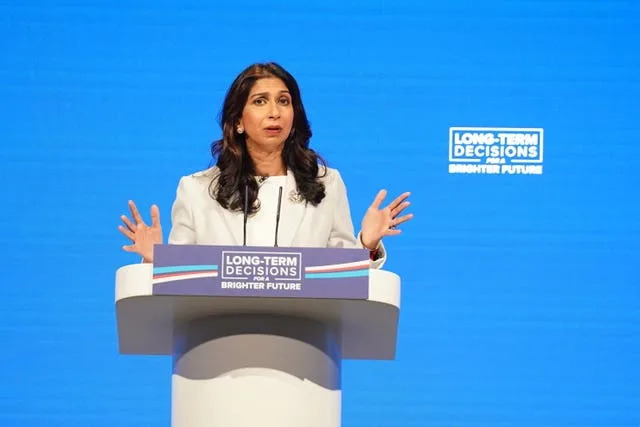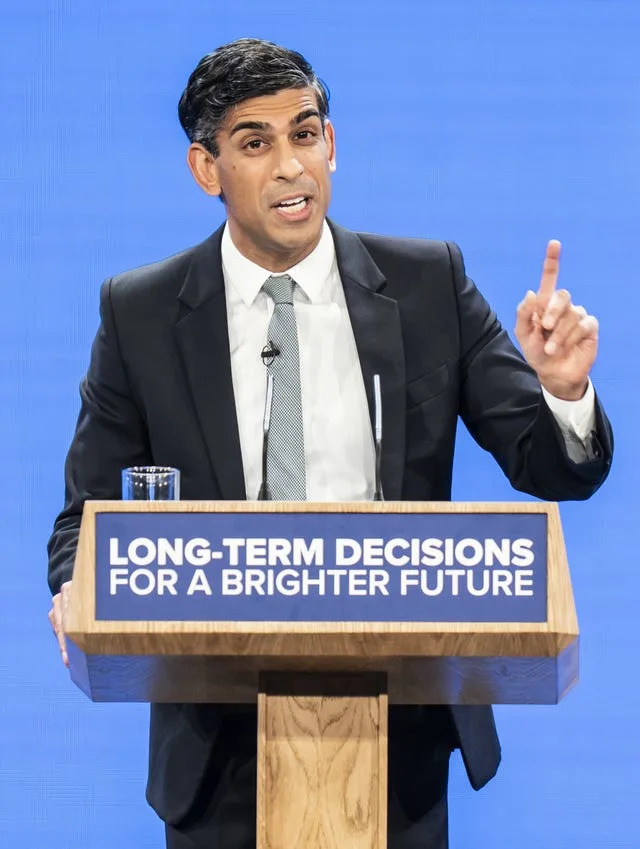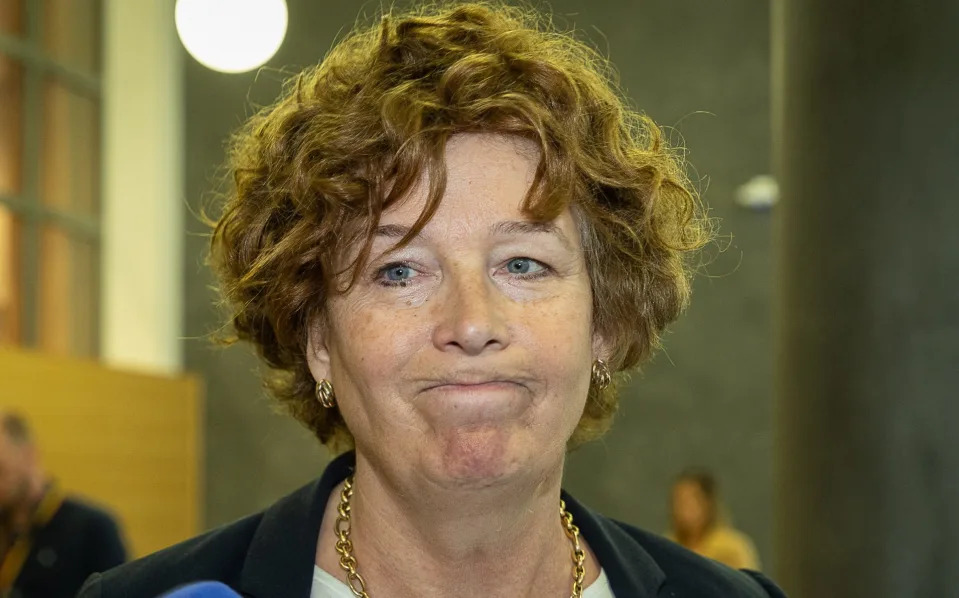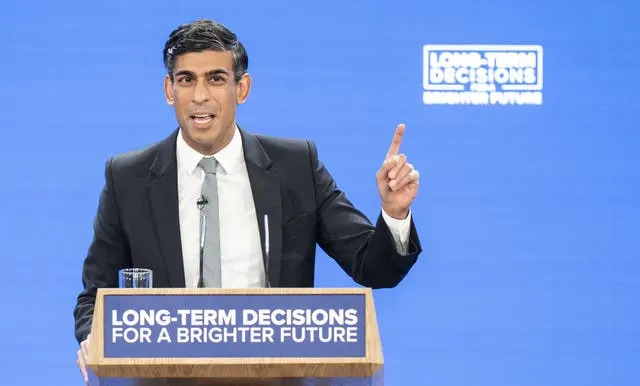Trans church minister warns community in ‘greater danger’ after Sunak’s comments
Aisling Grace and Danielle Desouza, PA
Fri, 6 October 2023
Members of the transgender community have criticised Rishi Sunak’s remarks at the Conservative Party conference, claiming his comments “put trans people in greater danger”.
The Prime Minister weighed in on debates about transgender rights during his speech in Manchester on Wednesday, saying: “We shouldn’t get bullied into believing that people can be any sex they want to be. They can’t, a man is a man and a woman is a woman. That’s just common sense.”
Methodist minister Dr Karl Rutlidge, 39, who is a transgender man, said he has faced “a difficult few days” following what he described as “transphobic” comments made by Government ministers at the Conservative Party conference.

Dr Karl Rutlidge said comments made by Rishi Sunak towards the transgender community were ‘appalling’ (Dr Karl Rutlidge/PA)
Mr Rutlidge, who is based in Kingston-upon-Thames, told the PA news agency: “It isn’t just Rishi Sunak who has made transphobic comments.
“Steve Barclay made comments about hospital wards… Suella Braverman made various inflammatory comments… followed by Rishi Sunak effectively dismissing the reality of trans lives and trans identities, which in the context of figures out showing that (transgender) hate crimes have gone up by 11% in the year ending March 2023 is appalling from the person who’s meant to set the tone as our Prime Minister.”
He said that these comments have the potential to empower those “who are already inclined towards transphobic attitudes” and “legitimises, potentially, even violence”.
“I think that having Government politicians make these kinds of comments puts trans people in greater danger,” he added.
“All I want to do is get on with my life with safety and dignity and peace.
“There’s so much more to me than the fact I happen to be trans and it feels like I’m treated like I’m not really a human being, like I’m an issue, and that’s incredibly difficult to deal with.
“I want to say to some of these politicians, ‘come and look me in the eye and talk to me as a real person’, because it just never seems to happen.”

Mr Rutlidge said comments made by Government ministers at the Conservative Party conference were ‘worse than I expected’ (Stefan Rousseau/PA)
Mr Rutlidge spoke about Brianna Ghey, a 16-year-old trans girl who was found with fatal stab wounds in February, adding that further violence towards the community “will only get worse”.
A transgender civil servant, who wished to remain anonymous, claimed that Rishi Sunak’s comments regarding transgender people at the Conservative Party conference are a “distraction” and “emboldening” transphobic people.
He told PA: “I would say the vast majority of people are far more bothered about the fact that their mortgages are doubling, that their food bills are doubling, they’re struggling to heat their homes and put food on the table, as opposed to anything to do with what is essentially other people’s medical history and medical background.”

A transgender civil servant claimed comments made about the transgender community at the Conservative Party conference are a ‘distraction’ (Danny Lawson/PA)
He claimed Mr Sunak’s speech “emboldens a certain sort of person that wants to be hostile towards us to think that they can be”.
“I’m openly trans on the internet but I’m not in day-to-day life, so no one knows and it’s no one’s business and no one has the right to know,” he said.
He continued: “It’s just pure dog-whistle politics, and they’ve got this distance that they’ve created where they don’t ever meet with any of us face to face.
“It’s all to do with ideology.”
A UK Government spokesperson said: “The Government has a proud history of advancing LGBT rights and one of the most robust legislative protection frameworks for LGBT people in the world.
“There is no place for hate crime in our society, it does not reflect the values of modern Britain, and we remain committed to ensuring these abhorrent offences are stamped out – which is why we have a robust framework to tackle it wherever it is found.
“However, we are clear that biological sex is fundamentally important to protecting single-sex spaces and providing appropriate healthcare as set out by ministers.”
Sunak is a bully, says Belgium’s trans deputy prime minister
James Crisp
Fri, 6 October 2023

Petra De Sutter said Rishi Sunak’s comments were ‘hurtful and very disappointing’ - James Arthur Gekiere/AFP via Getty
Belgian’s transgender deputy prime minister has called Rishi Sunak a “bully” after he said a “man is a man” during his showpiece speech at the Conservative Party conference.
Petra De Sutter, the world’s first transgender cabinet minister, said Mr Sunak’s remarks on gender were “hurtful and very disappointing” and accused the Prime Minister of “fuelling transphobia”.
In his closing speech in Manchester on Wednesday, Mr Sunak claimed it was “common sense” to say that “a man is a man and a woman is a woman”.
“Hurtful and very disappointing,” Ms De Sutter wrote on X, formerly known as Twitter, above a video of the speech.
“These words are fuelling transphobia and endangering the lives of many people around the world. Trans women are women, and in no way a threat to others.”
Ms De Sutter also appealed to Mr Sunak not to “join the real bullies” after he made the remarks – his most explicit on the subject – in his hour-long address to the Tory grassroots.
Sir Keir Starmer, the Labour leader, whose party is leading the Tories in the polls, has struggled to explain his own stance on trans rights ahead of its conference, which begins this weekend.
Suella Braverman, the Home Secretary, also took aim at “gender ideology” in her speech, while Steve Barclay, the Health Secretary, said he would ban transgender patients being treated in single-sex wards.
Ms De Sutter, 60, is a member of the Green party and became a deputy prime minister in the coalition government in 2020. The former MEP was a doctor and gynaecology professor before becoming a politician.
As Belgium’s first transgender MP, she earned a reputation for combining a passion for LGBTQ+ rights with a sense of humour.
“I entered politics in 2014 and I was already under attack,” she once said. “I have the skin of an elephant – I am not afraid of attacks. I expect it. The trolls will continue, but I will ignore them. Fortunately, they are a minority.”
James Crisp
Fri, 6 October 2023

Petra De Sutter said Rishi Sunak’s comments were ‘hurtful and very disappointing’ - James Arthur Gekiere/AFP via Getty
Belgian’s transgender deputy prime minister has called Rishi Sunak a “bully” after he said a “man is a man” during his showpiece speech at the Conservative Party conference.
Petra De Sutter, the world’s first transgender cabinet minister, said Mr Sunak’s remarks on gender were “hurtful and very disappointing” and accused the Prime Minister of “fuelling transphobia”.
In his closing speech in Manchester on Wednesday, Mr Sunak claimed it was “common sense” to say that “a man is a man and a woman is a woman”.
“Hurtful and very disappointing,” Ms De Sutter wrote on X, formerly known as Twitter, above a video of the speech.
“These words are fuelling transphobia and endangering the lives of many people around the world. Trans women are women, and in no way a threat to others.”
Ms De Sutter also appealed to Mr Sunak not to “join the real bullies” after he made the remarks – his most explicit on the subject – in his hour-long address to the Tory grassroots.
Sir Keir Starmer, the Labour leader, whose party is leading the Tories in the polls, has struggled to explain his own stance on trans rights ahead of its conference, which begins this weekend.
Suella Braverman, the Home Secretary, also took aim at “gender ideology” in her speech, while Steve Barclay, the Health Secretary, said he would ban transgender patients being treated in single-sex wards.
Ms De Sutter, 60, is a member of the Green party and became a deputy prime minister in the coalition government in 2020. The former MEP was a doctor and gynaecology professor before becoming a politician.
As Belgium’s first transgender MP, she earned a reputation for combining a passion for LGBTQ+ rights with a sense of humour.
“I entered politics in 2014 and I was already under attack,” she once said. “I have the skin of an elephant – I am not afraid of attacks. I expect it. The trolls will continue, but I will ignore them. Fortunately, they are a minority.”


















